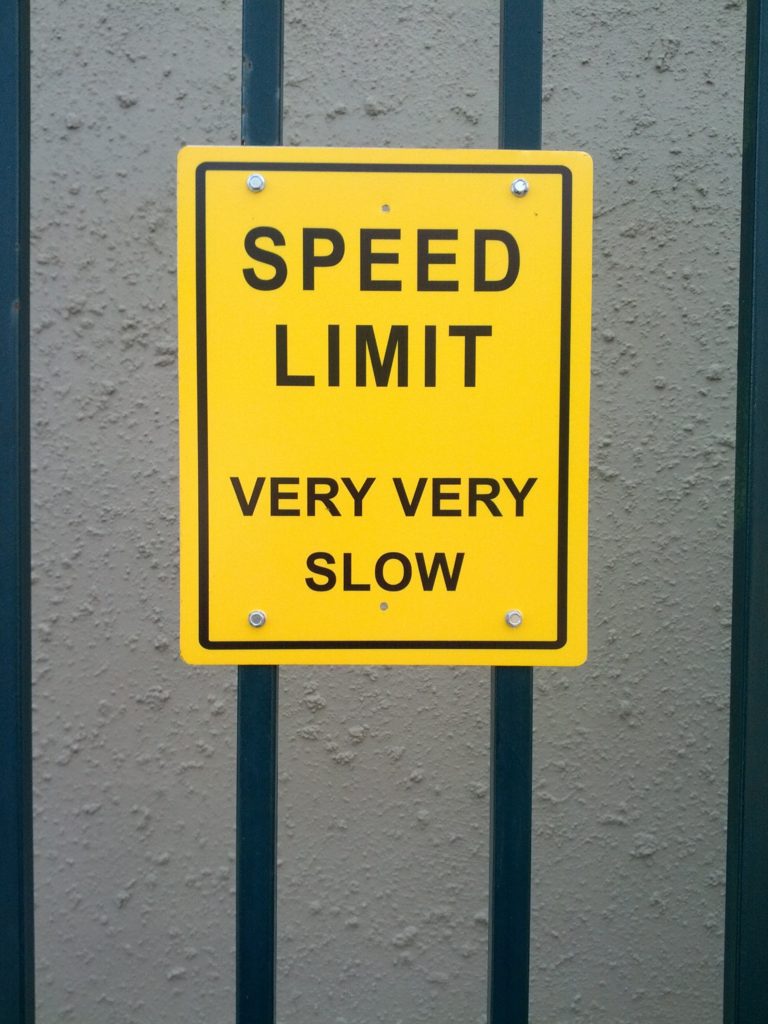Opener: At what pace do our children operate? Typically it’s not anywhere close to that of an adult. Yet we’re constantly pushing them to perform at our pace. What I’m finding is that I actually speed up connecting with them in relationship when I slow down (thus speeding up while slowing down). But that’s not nearly as easy as it sounds!
Introduction
Happy Black Friday y’all! I figure you need something to read while standing in those long lines early in the morning. And what could be better than a post on speeding up while slowing down? My wife and I have thoroughly enjoyed the television show The Flash. The creators of the show often choose to portray the speed at which The Flash is running by slowing down everything around him. As we have watched this show, I have often thought how convenient it would be if I could move at Flash speeds. But, alas, for us mere mortals, we must find other ways to speed up while slowing down. Let me tell you why (and this is especially true for parents).
In chapter 3 of my book The Relational God, I tell the story of my daughter cleaning her guinea pig’s cage for the first time. She was excited and she did the task out of joy, but it took her a ridiculously long time. In the story, I talk about how I could have done it so much faster, but how it was healthy for me to allow her to learn the task. Fast forward two years. Today, I was helping her, because we were racing against an impending storm. While helping her, I had the distinct thought that parenting is really about learning how to speed up while slowing doing. Let me explain.

Speeding up while Slowing Down
Time never seems to slow down, does it? On the contrary, it seems to speed up (just as we want more of it). But do you remember how time seemed to move when you were a kid? It never moved fast enough. It crawled. You were always waiting. And that is the world our children inhabit. They have no sense of urgency, because they have very little control over their time. We may be their only sense of urgency, and too often they don’t understand the rush.
When we become parents, we receive a lot of new responsibilities and obligations, and one of the chief skill sets of parenting is learning how to balance all those new responsibilities and obligations (which requires speeding up), while simultaneously slowing down to our children’s speed . . . so life does not overwhelm them. How do we do this? The answer, I’m afraid, isn’t easy or popular, but it is simple. We have to take the time.
Repetition
We all get the same amount of time, but we tend to use it very differently. Some of us (like me) try to cram as much into our days as we can. We get up early and we go to bed late. We are constantly moving. Sometimes, we move so fast that we forget there are more important things than what is on our never-ending to-do list. But the things that are more important are hard, because they require us to prioritize monotony. There are only three commands in Scripture for parents. The first is that we teach our children, and the Bible is clear that we are to teach our children through the repetition that comes from creating memorials.* Repetition and memorials take time and intentionality, and time and intentionality are two things that we usually don’t have when we’re just moving to the next thing.
Slowing Down
Since I am very task oriented individual, I tend to measure success by what I accomplish. Thankfully, my wife is more relational. She feels successful by spending quality time with others. She connects most effectively with our children when she gets down on their level; when she slows down to their pace; and when she does not overwhelm them with adult stuff.

That is very hard for me, probably because the faster I move, the more I accomplish. What our children often require, though, is for us to move less fast.
To slow down and do life at their pace.
That is how teaching through memorials takes place. We have to slow down long enough to establish memorials and continue to slow down to recognize and acknowledge them. Here’s the funny thing, though. When I do this, I find myself frustrated at the lack of stuff getting accomplished, but I am amazed at the speed at which I am able to connect with my children at a deeper level. I am not driving them toward a goal or pushing them out the door. Rather, I am relating to them as a human being instead of a human doing, and they respond to this.
When I slow down my tasks, I speed up my ability to relate.
I’m not distracted.
I can focus.
And undistracted focus is key to connecting relationally. So then I must ask myself, what distracts me? What steals my focus? In addition to tasks what too often steals my focus is technology.
Distractions
I meet with a group of men on Thursday mornings, for a gathering we have named Bagels and Bible Study. We have been reading The Tech-Wise Family by Andy Crouch. In chapter 4 Crouch discusses the concept of Sabbath (generally) and specifically Sabbath from our devices. As he described the “simple” task of taking a break from our devices, it was refreshing to think about what such a break would mean for relationships in our family. I think technology is a distraction for many of us, but perhaps you are distracted by something else. Think about how you might take a break from that thing in order to focus on your relationships (and, if technology is a distraction, I would strongly recommend Crouch’s book).

Prioritizing
So how can we get better at slowing down while simultaneously accomplishing all that must be done? I would encourage you to take a long hard look at that word must. Start working on cutting back on the non-musts in your life. Even some of the musts should be examined for their power in our lives. Ask, why are the musts the musts? Are you working too much, because it gives you a sense of accomplishment (instead of finding your identity in Christ)? Are you pushing your kids too hard at school, because you don’t want them to fail (instead of trusting God with their future)? What are you valuing to the point of distraction. Why do you value it that way?
The End
There are no easy answers here. Nor have I “arrived” (by any stretch of the imagination). I was mostly just trying to work out this idea a little bit in my head. Let me suggest three things for you to try this week:
- Come alongside something that your kids are doing this week (even if it is a chore). Slow down and just be with them. Help them, but let them set the pace.
- Think about your weekly schedule. Discuss it with your spouse. What could you cut out? If your kids are old enough, ask them too. Then take active steps to slow down (even if its just a little). For me, today, this meant being okay with a few things not getting done. It meant that some of our chores either went by the wayside or didn’t happen at all. This may seem small, but for me it was a really big deal. It also allowed me to be less of a driver today.
- Put away your screens. In The Tech-Wise Family, Crouch advocates for an hour a day, a day a week, and a week per year. Yikes! Start with the hour per day or the one day per week. I think you’ll find it difficult but refreshing.
The moral of the story (and a truth that I will need to return to on a daily basis): by slowing down, you actually speed up.
Additional Resources
If you enjoyed this post, you may also enjoy my book on relational theology.
*For more information on teaching our children through repetition and memorials, see chapter 11 of my book, The Relational God.
Additional Thoughts
This post is part of a series on Difficult Passages. As I teach or study certain passages and topics, I find it helpful to coalesce my thoughts into a cogent blog post.
Encouraged?
- Add your comments or questions below
- Share this post using the share-buttons at the top right of this post.
Picture Credit
“The Flash: ‘Fast Lane’ Review” by BagoGames is licensed under CC BY 2.0
“Speed Limit Very Very Slow” by Eric Fischer is licensed under CC Attribution BY 2.0
“Businessman connecting tech devices” by Arismendy Polanco is licensed under Public Domain Mark 1.0

